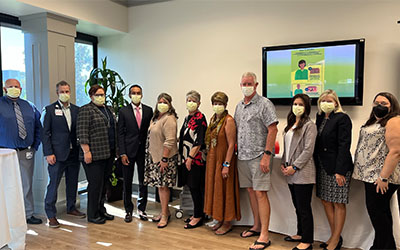Emanuel Cancer Center Celebrates Launch of New Scalp Cooling System
Sep 23, 2022Turlock, Calif. – Sept. 23, 2022 – Emanuel Cancer Center held a special event to celebrate the launch of its new scalp cooling system, DigniCap. The new equipment is sponsored by the Bill and Elsie Ahlem Cancer Endowment.
On Friday, Sept. 23, 2022, hospital leaders, employees and endowment members gathered for a presentation on the new equipment.
 “When the Bill and Elsie Ahlem Cancer Endowment approached our team about a new treatment that would reduce hair loss during cancer treatment, we jumped at the chance to be a part of that and to offer that to our community,” said Murali Naidu, M.D., CEO of Emanuel Medical Center.
“When the Bill and Elsie Ahlem Cancer Endowment approached our team about a new treatment that would reduce hair loss during cancer treatment, we jumped at the chance to be a part of that and to offer that to our community,” said Murali Naidu, M.D., CEO of Emanuel Medical Center.
Hair loss is a common side effect of cancer treatment that can make some patients feel self-conscious or uncomfortable. DigniCap offers patients the ability to reduce hair loss from certain chemotherapy treatments.
“On average, 65 percent of people who are undergoing treatment for cancer have hair loss associated with their treatments. For some cancer treatments, it’s as high as 100 percent,” Dr. Naidu explained. “Cooling the scalp prior to chemotherapy has been shown in studies to reduce that hair loss, visible hair loss, by two-thirds. It is a dramatic difference.”
Christie Marriott, who is a previous user of DigniCap, spoke at the event and explained the impact it had on her during her cancer treatments, “I did not lose my hair. I did experience thinning of the eyebrows, my nasal hairs were gone, but I did not lose the hair on my scalp. I am a professional. I am a banker, and it was important to me that I did not appear unhealthy. I am so thrilled this is here [for Emanuel patients].”

The DigniCap Scalp Cooling System consists of a computerized cooling unit that is managed through a touch screen display and an attached cooling cap. Temperature regulated coolant continuously circulates through specially designed channels in the cooling cap. Reduced temperature results in a decreased blood flow to the scalp area so that less chemotherapy reaches the hair cells. Therefore, hair cells are not exposed to the full dose of chemotherapy and may be able to survive the chemotherapy treatment. As a result, hair is less likely to fall out.
“Being able to be in your life, doing what you want to be doing. That’s the whole point. To make sure that people can live the life that they want to live,” Dr. Naidu said.
“We thought of all the women who’ve had breast cancer, and on top of that, also losing their hair, it just adds more layers of stress on top of it. Anything we can do to prevent that, we felt was worthwhile,” said Jim Ahlem, spokesperson for the endowment. “Thank you to everyone who is here. Thank you for everything you do for our community.”

